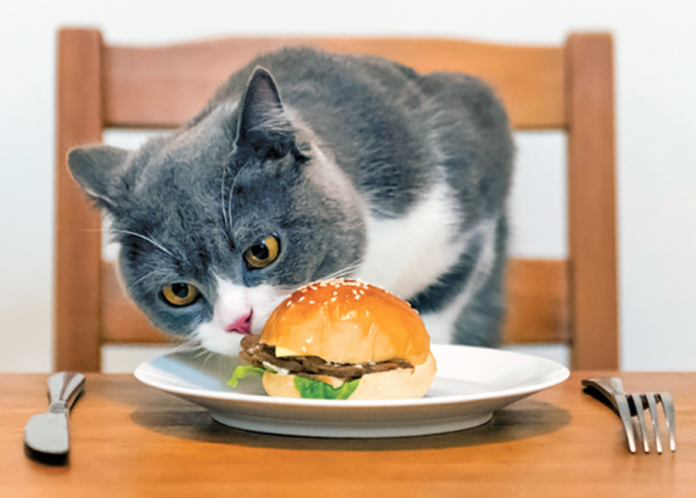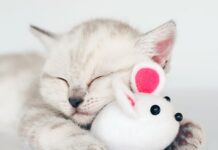Everyone loves a treat, and that includes your cat. Sharing your food with your cat can be fun for both of you, but you need to remember that human foods should not completely replace a nutritionally balanced diet prepared specifically for your cat.
Tuna is a common, well-loved ingredient in cat foods. Tuna is high in protein and moisture content, which will help to keep your kitty hydrated. But be careful when feeding your cat tuna intended for human consumption. Tuna and other canned fish usually contain mercury, and consuming too much can lead to mercury poisoning.
Check what the tuna is packed in. The most common options are oil and salt, or water. Oil and salt can be problematic because they can cause stomach upset and can worsen kidney and/or heart problems. Opt for tuna that has been packed in water, and better yet, give it an extra rinse before serving to your cat.
The water from canned tuna can be useful to entice a sick cat to eat, however. If your cat is ill and not eating well, ask your veterinarian if a little tuna juice is worth trying to stimulate her appetite.
Pictures of a cat drinking milk from a saucer of milk are misleading. Many adult cats are lactose intolerant and can’t digest it properly. Just like lactose intolerant people, these cats can suffer from diarrhea and GI upset if they consume milk. If that’s not enough, remember that the fat in whole milk and cream can contribute to obesity in cats prone to snacking a bit too much and exercising a bit too little.
Raw milk can be contaminated by pathogens including Salmonella and Listeria, potentially causing serious illness for your cat.
If a young kitten requires supplementation, kitten milk replacer is a better choice than cow’s milk. The kitten milk replacer or kitten formula has been formulated to meet kittens’ special nutritional needs.
Deli meats are a tasty treat that many cats enjoy. The problem is that they often have a high sodium content. This can exacerbate heart and/or kidney disease and can theoretically lead to sodium intoxication (this is rare). Whole cuts that have been cooked and sliced are better options than processed products such as salami.
Meat meal is fine. Pet food marketing is awash with boasts that the diet contains “real meat” and no meat meal. The truth of the matter is that chicken and chicken meal come from the same place—a chicken. The quality of that original chicken (or other animal) will determine the quality of the resulting meat or meat meal. Meat meal often contributes to higher protein content in pet foods because it is concentrated and doesn’t have the water content of whole meat.
Limit coconut oil. While it’s no miracle cure-all, small amounts of coconut oil will not harm your cat. Large quantities could cause stomach upset and diarrhea. Coconut oil is calorie-dense, making it a poor choice for hefty cats.
Yes, your cat can have hamburger! Hamburger is a great source of protein and usually easily digestible. But skip the seasonings and don’t feed hamburger exclusively. Hamburger is not a balanced diet on its own. Hamburger should always be cooked, even for your cat, to prevent infections by bacteria and/or parasites that may be in raw beef.
Perk: If your cat is having diarrhea, plain hamburger may be a good option for a bland diet to give her GI tract a break for a day or two.
Skip grapes and raisins. These are known to cause acute kidney failure in dogs. The potential for this problem in cats is less well understood, but it is better to avoid feeding grapes and raisins to your cat just in case (she probably wouldn’t seek them out anyway).
Onions and garlic. Misinformation about “healing powers” of onions and garlic is everywhere. In reality, onions and garlic, along with chives, irritate the GI tract and can damage red blood cells in cats.
If your cat eats a bunch of onions, your veterinarian will probably look at a blood smear to check for Heinz bodies, bits of denatured hemoglobin in red blood cells that can be caused by oxidation by compounds found in onions.
Small amounts of onion or garlic powder in a sauce or treat are unlikely to cause harm unless those foods make up a large part of your cat’s regular diet. For example, using meat baby food seasoned with onion as a treat is unlikely to be a problem for your kitty, but feeding it every day could cause anemia (due to red blood cell damage) over time.
Eggs are a great food for your cat to enjoy. They are easily digestible and contain lots of protein and amino acids. Make sure the eggs are well cooked to prevent bacterial infection, and skip the salt and pepper. As with everything else, cooked eggs can be a nice treat for your cat, but should just be part of your cat’s balanced diet.
Corn is nutritious. Pet-food marketing likes to pick on corn, calling it a cheap filler. In reality, corn is a great source of energy and other nutrients for your cat, including essential amino acids, fatty acids, linoleic acid, and protein. Corn is also a rare culprit for food allergies in cats.
Organic choices. We still don’t really understand the impact of organic foods on people, let alone cats. Much more research needs to be done to evaluate whether organic foods truly make a difference in the health of our cats. Hopefully, it will appear soon.



